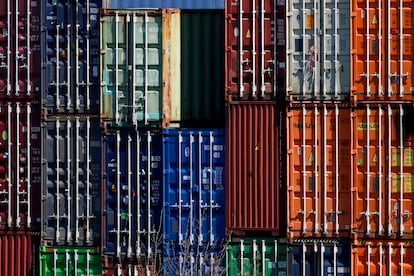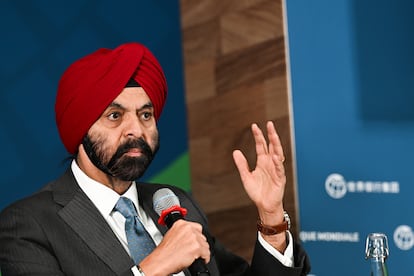Global trade takes a hit from Trump’s tariffs
Forecasts from major international organizations warn of the impact of the US president’s economic policies on the exchange of goods

Economic forecasts are organized mirages. Making predictions in these troubled times is like asking a short-sighted person without glasses to describe the horizon. Even so, reports from international organizations are beginning to emerge that attempt to put figures to the sense of anxiety the global economy is experiencing following Donald Trump’s crackdown on trade. The U.S. president’s aggressive tariff policy threatens to curb international trade, hinder economic growth, and fragment the economy.
The World Trade Organization (WTO), the multilateral institution that sets trade rules, estimates that merchandise trade will decline by 0.2% this year due to new U.S. tariffs. The organization, chaired by Nigerian President Ngozi Okonjo-Iweala, published its new forecasts for world trade on Wednesday, reflecting the climate of uncertainty spreading across the globe following Trump’s decision to establish a general 10% tariff with additional levies for countries with which the United States maintains the largest trade deficit. Although the U.S. president has decided to postpone the increased tariffs for 90 days while he negotiates in parallel with nearly 70 countries, he maintains a fierce battle with China, which threatens to disrupt the trade order in place since the Great Depression almost a century ago.
“The new estimate for 2025 is almost three percentage points lower than what it would have been without the recent changes,” the organization explains in its report, released Wednesday. In an interview with the Financial Times, Okonjo-Iweala warned that the trade war between the U.S. and China risks dragging the world into a recession. The Nigerian economist expressed concern about economic and geopolitical fragmentation, with a growing dissociation between Washington and Beijing that forces other countries to take one side or the other. “If that happens,” the WTO director-general warns, “global production could fall by 7%.”
Okonjo-Iweala is not the only one urging caution among the leaders of major powers. World Bank President Ajay Banga warned this Wednesday at the organization’s headquarters in Washington that increased uncertainty and economic instability will weigh on the global economy. “It will certainly lead to lower growth than expected just a few months ago,” he noted.
The head of the World Bank, an institution created after the Bretton Woods conferences in July 1944, at the end of World War II, to forge a new global economic order based on multilateralism, which is now faltering, argued that trade tensions are causing economic agents to become more cautious: “Uncertainty and volatility are undoubtedly contributing to a more cautious economic and business environment. I think that’s going to affect our governments and businesses make their investment decisions right now,” Banga said.
In this context of profound uncertainty, with no clear rules of the game, and with Trump changing tack every day, Banga calls on countries to “sit down and negotiate as soon as possible to establish a dialogue on trade issues.”

Banga, who gave a press conference prior to the annual meeting of the International Monetary Fund (IMF) and the World Bank, encouraged developing countries to strengthen their bilateral and regional ties to seek an alternative to trade with the United States.
The IMF also joined the chorus of voices warning this week about the impact of tariffs on global trade. The organization, chaired by Bulgarian President Kristalina Georgieva, is finalizing preparations for its major annual meeting in Washington, but first wanted to make clear the danger posed by the United States’ political shift. “Geopolitical risk could manifest itself in the form of trade tensions. Trade tensions, such as tariffs, trade wars, and sanctions, could be imposed for geopolitical reasons and affect international relations and economic activity,” states the report published this week by the Fund.
Specifically, this economic instability will very likely lead the European Central Bank (ECB) to cut interest rates by a quarter of a point this Thursday, to 2.25%. Beyond the monetary policy decision, analysts are awaiting Christine Lagarde’s speech on the U.S. trade volte-face.
Across the Atlantic, Federal Reserve Chairman Jerome Powell is advocating caution in these uncertain times, as the two major central banks risk disengaging and taking different paths due to the unequal impact tariffs could have on the U.S. economy (stagflation) and Europe (lower growth). On Wednesday, at the Economic Club of Chicago, Powell emphasized the inflationary risks of tariffs and expressed his support for waiting for greater clarity on Trump’s erratic policies before deciding on the price of money.
The Fed chairman placed particular emphasis on the consequences of trade policy. “The level of the tariff increases announced so far is significantly larger than anticipated. The same is likely to be true of the economic effects, which will include higher inflation and slower growth. Both survey- and market-based measures of near-term inflation expectations have moved up significantly, with survey participants pointing to tariffs. Survey measures of longer-term inflation expectations, for the most part, appear to remain well anchored,” he explained.
Trump’s measures have complicated Powell’s job. The Federal Reserve’s dual goals are full employment and price stability, and the trade war is making both difficult. The U.S. economy was growing strongly, with very low unemployment and inflation almost under control, but now uncertainty and instability are the dominant tone in the face of Trump’s chaotic measures and his constant rectifications and band-aids. Powell acknowledged Wednesday that the economy is “moving away” from both objectives. At the same time, he noted that job creation depends on price stability. For now, he prefers to wait and see. “For the time being, we are well positioned to wait for greater clarity before considering any adjustments to our policy stance,” Powell said. Quick translation: there will be no rate cut in May.
While the United States remains in open negotiations with more than 70 countries over tariffs, the world is sinking into a certain economic pessimism. In an article published this week, Peterson Institute economists David H. Feldman and Gary Clyde Hufbauer warn that Trump’s tariff drift “may be able to bully small nations that depend on us, but in the international power game the European Union, China, and Japan will push back with bad consequences for America. We risk reigniting the kind of zero-sum international trade aggression that characterized the period between the First and Second World Wars, a time when militarism led to a global cataclysm.”
Sign up for our weekly newsletter to get more English-language news coverage from EL PAÍS USA Edition
Tu suscripción se está usando en otro dispositivo
¿Quieres añadir otro usuario a tu suscripción?
Si continúas leyendo en este dispositivo, no se podrá leer en el otro.
FlechaTu suscripción se está usando en otro dispositivo y solo puedes acceder a EL PAÍS desde un dispositivo a la vez.
Si quieres compartir tu cuenta, cambia tu suscripción a la modalidad Premium, así podrás añadir otro usuario. Cada uno accederá con su propia cuenta de email, lo que os permitirá personalizar vuestra experiencia en EL PAÍS.
¿Tienes una suscripción de empresa? Accede aquí para contratar más cuentas.
En el caso de no saber quién está usando tu cuenta, te recomendamos cambiar tu contraseña aquí.
Si decides continuar compartiendo tu cuenta, este mensaje se mostrará en tu dispositivo y en el de la otra persona que está usando tu cuenta de forma indefinida, afectando a tu experiencia de lectura. Puedes consultar aquí los términos y condiciones de la suscripción digital.








































